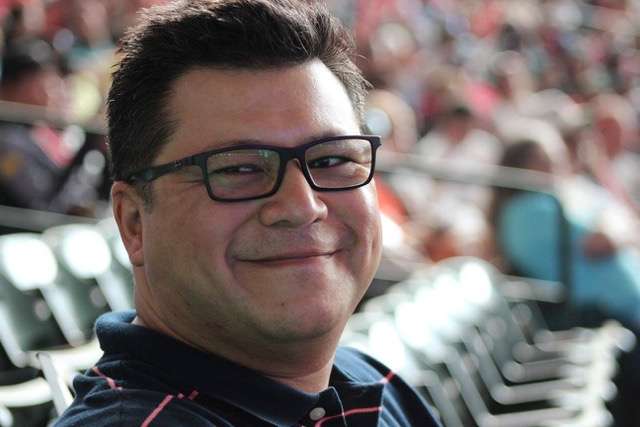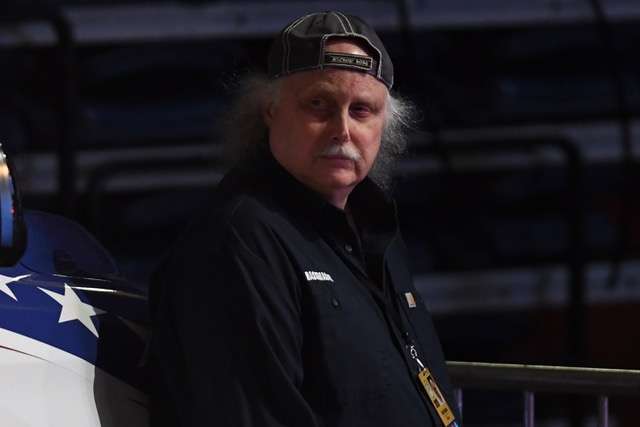
“Let me photograph…”
Dateline: The junction called art and life
“We turn the cube and it twists us.”
— Erno Rubik
You ask of me one thing, and that is to tell the truth.
My bosses ask that of me as well, to be a storyteller, not an instructor on how to tie lines, or what frog to throw to the weeds.
They and you ask me to write about what it is I see, what it is I am standing in, to parse information and tell a truthful tale.
I tell you this, and the bosses this, because the following story is not what I pitched to the mothership of B.A.S.S. It has some of the pitch, but not much.
The “cube” was this … how B.A.S.S. Times artist Steve Donis saw the 50th Bassmaster Classic through his pen and words.
But life pitched something different our way.
And so the following story instead is about the “twist.”
As it should be, if you demand that the tales we tell be based in truth.
db
“…you in this light…”
Meet Steve Donis (shown above).
“I’m 49 years old, been married to my wife Vicky for, um, 20, no 22 years, have three children Sara 20, Maya 16 and … (then he starts laughing) … Emily, she’s you know, 6…”
I know but don’t ask.
I am in COVID-19 lockdown in Connecticut, Steve is in the same situation but in Illinois just outside Chicago.
I met Steve in the media center at the 50th Bassmaster Classic, had no idea who he was or what he did. He was with B.A.S.S. Times Editor Bryan Brasher, we shook hands along with some small talk, polite stranger stuff.
Bryan: “Steve does work for B.A.S.S. Times.”
Me: “Oh,” in a room filled with writers I just thought …
Bryan: “He draws those cool illustrations.”
Me: “… huh, what?” (I turn to the new guy named Steve.) You draw, are you an artist?”
Steve just smiles (the right answer).
Me: “Let’s talk …”
And so we do, out of hearing of all the other writers in the room because frankly I don’t want them to know what I’m doing. Frankly, I’m sure they don’t care but trust me any reporter who talks about possibly very cool stories around other reporters won’t be a reporter long. I’m not in the tip giving business.
So we talk about Steve drawing his personal view of the Classic, something very cool and colorful, one that would show not only those on stage but those who build the stage, those who weigh the fish …
“Steve this Classic gig I always go into it as if I’m writing about an orchestra, not just the conductor or first violin but also the fourth fiddle guy and the dude dinging the triangle in the back row. Can you draw that?”
“… yeah that’s great that’s what I see to, real colorful, lots of moving parts and views, I get it, get it, lets do it.”
So that’s what I tell B.A.S.S. I’m going to do, and a couple weeks later I get this photo of this drawing.

“This is how I see it, wanted you to see it before I ink it.”
I dig it so I send the B.A.S.S. bosses a note that said something like: “It’s on.”
And at that time, it was …
… but.
“…in case it is…”
A week goes by, nothing from Steve, no big deal. I’m walking the neighborhood taking pictures of flowers … bored.
Ten days, more flower photos, no ink from Steve, 12 days, nothing, two weeks …
“Hello.”
“Hey Steve, db here man, just wondering what’s going on with the art, need to get this in soon don’t want to be five or six weeks post Classic you know …”
“Oh right, um, ah, um …”
And within a few seconds I felt terrible …
“…db, my mom, and my sister, they tested positive for COVID, both pretty sick and my wife and I have had to do a lot for them, as we should, but we have to be careful you know with what we do …”
Wow, I just gave the guy the “Dude what are you doing” call and now …
“… you know my daughter, my beautiful Maya, she’s 16, she has cerebral palsy, and my doctor friend told me that with Maya and her trach that if she got it, you know it would not be good …”
One phone call and I’m going to hell, talk about feeling bad.
As explained above, this is where the twist comes.
It ain’t about the Classic anymore.
Both Steve’s parents, his mom Manuela and his father Hector, came to this country from Central America. “My father was a blue collar guy, was a truck mechanic, my mother worked in a factory.”
Steve went to college to be “… an accountant, it’s what my father wanted, he said I’d always have a job, be important and take care of my family, but I hated it, hated all the BS that went with it …”
“When did you start to draw?”
“Ah, kindergarten, I won a drawing contest, I drew a working man like my father, I drew him wearing a tool belt with tools in it. My teacher was so impressed that she called my parents to tell them how good she thought I was.”
“What did your father think?”
“He was happy, proud, but he didn’t think I could support a family drawing stuff, he wanted me to fit in, fit in was big, he told me he named me Steve, an American name, so that I would fit in, it was important to him.”
Steve … American name …
To be honest, that quote took my breath away.
“But I’m sorry about the drawing, my mother and sister were in the hospital, they were not in good shape, I had to take care of them you know, family first.”
And this image, this is the moment Steve found out about his mother and sister.
This is the exact moment in time when the coloring stopped and reality crept in.

“…that we might be exactly…”
Life, truth, is not a cartoon.
As a writer you are faced with what are called “Editorial Decisions.” The one that applies here would be to just sit back and wait, tell the B.A.S.S. bosses that the story will be in soon, buy some time.
Ignore reality for story deadline.
But I believe that to do so is to gyp you of the truth, but truth is the greatest story, no matter where it takes you.
No matter what you’ve sold to the bosses.
And so with this story you get the twist, and not the cube, the Rubik of Journalism.
But when all is said and done, it is a story, a three-part gig with a beginning, middle and end.
And that comes here.

Through Steve’s pen, this is how he tells you this …
… Mom and sis (Sherry) are out of the hospital and fine.
With this story life truly meets art.
In living color.
db
“..like we were.”
When We Were Young
Adele
“Nothing is so painful to the human mind as a great and sudden change.”
— Mary Shelly
Frankenstein

